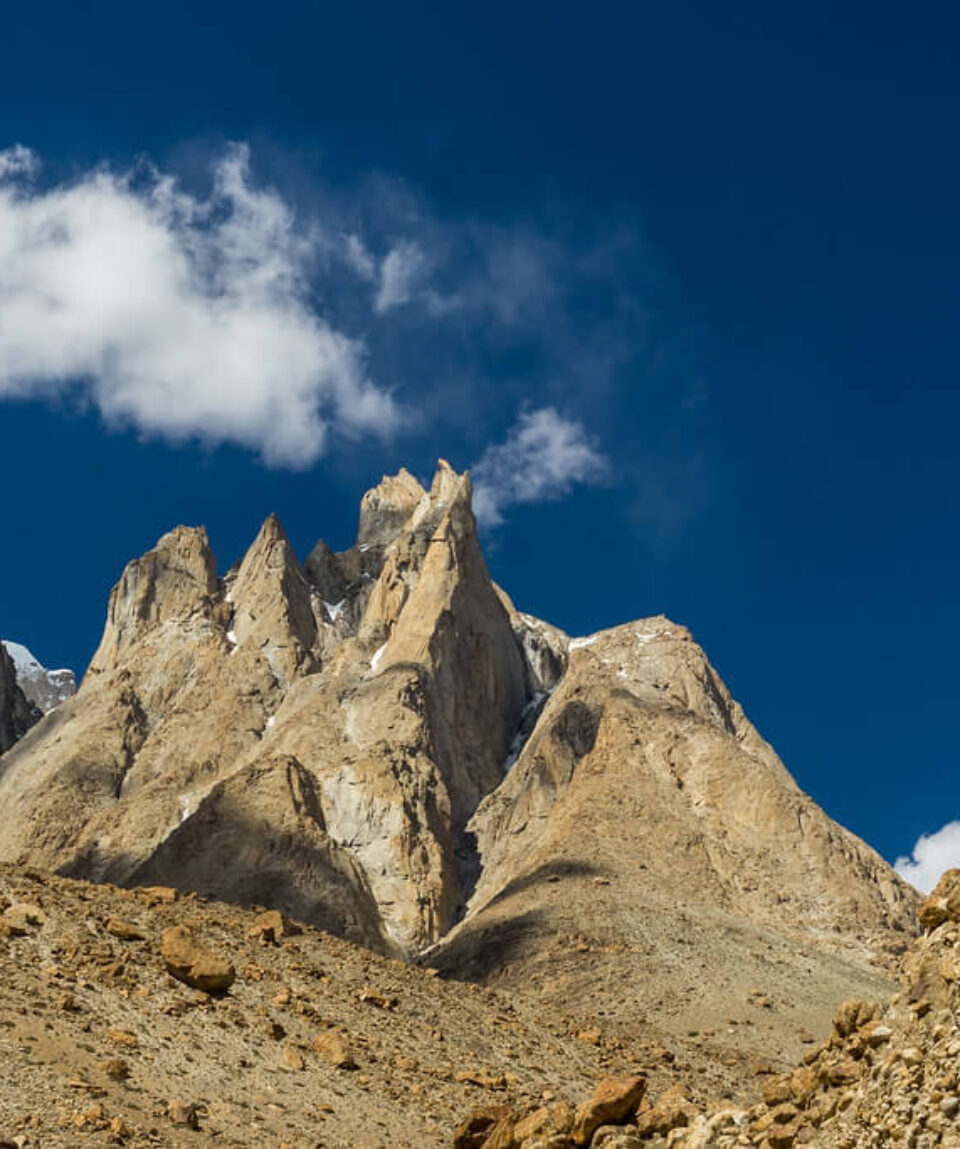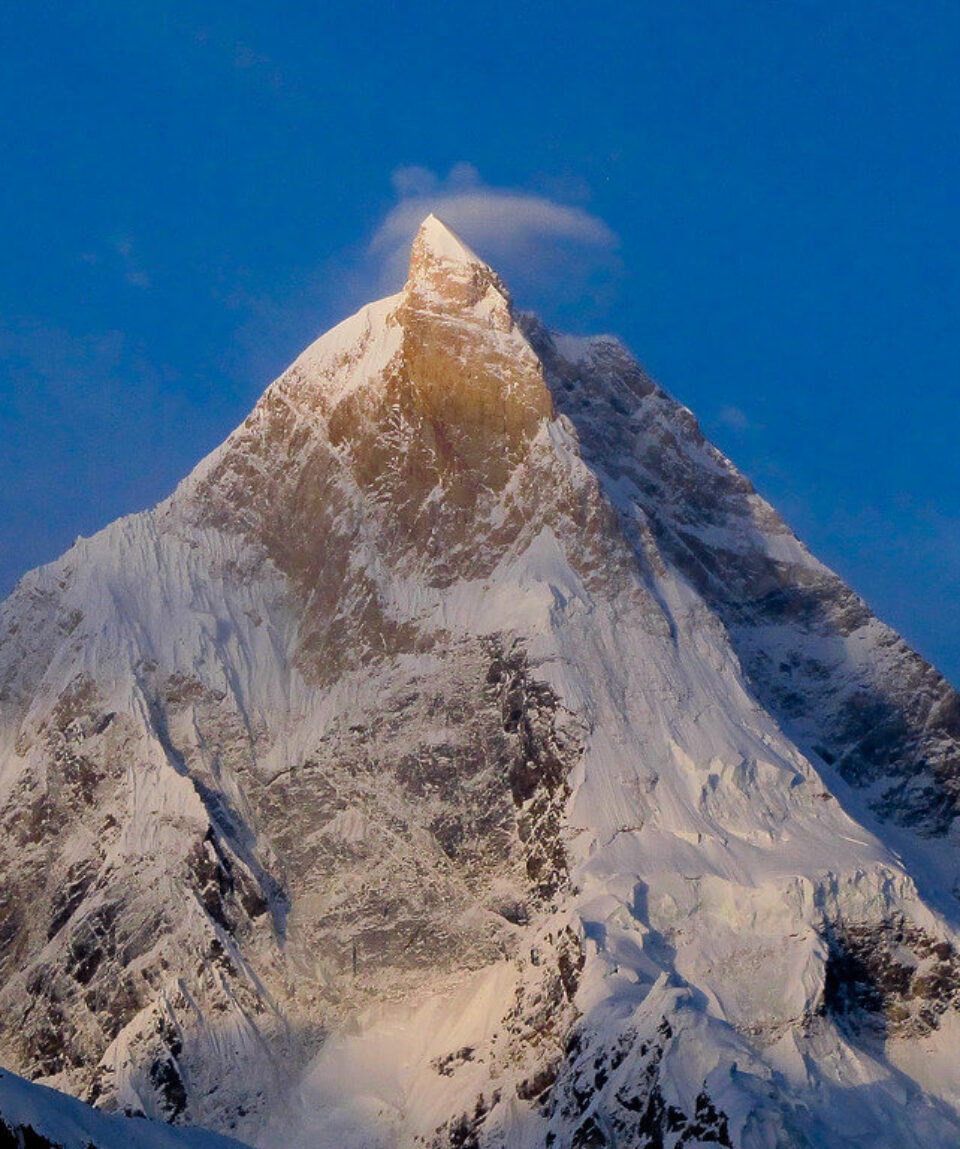Karakoram Trek – Four 8,000m Base Camps
fromThe Karakoram trek—featuring four magnificent 8,000-meter base camps—is one of the most alluring opportunities for foreign trekkers.
-
Reviews 0 Reviews0/5
-
Vacation Style Holiday TypeCamping, Climbing, Guided, Mountaineering, Rock Climbing, Trekking
-
Activity Level Tough
-
Group Size Large Group
The stunning Baltoro Glacier, K2 Base Camp, Trango Tower Base Camp, Gasherbrum I & II Base Camp, Gondogoro La, and the lovely Hushe Valley are all parts of our Karakoram journey to major base camps.
We have extremely skilled and knowledgeable personnel to lead you on the Karakoram journey. They are also among the best in Pakistan’s Gilgit-Baltistan. The crew contributes a great deal to contribute to the general success and pleasure of our groups and has a great deal of expertise in attending to all of the participants’ demands.
Along with easy customization options, ATP offers the ideal itinerary in terms of acclimatization, fun, and safety. Over 50 peaks higher than 7,000 meters and 70 peaks higher than 6,000 meters can be found in the region where our Karakoram trek is conducted. One life would not be enough to fully explore the area; it is certainly an adventurer’s dream come true.
Trek via the Baltoro glaciers and the Base Camps of the five highest peaks over 8000 meters to see the natural splendors of this stunning area.
The upper Baltoro Massif, K2 (8616m), the second-highest peak in the world, as well as the world’s most stunning high natural pyramids, including Broad Peak (8,048m), Gashabrum I to 6, Golden Throne (7,240m), and Chogolisa (7,665m), cannot be seen from any other location on Earth with such breathtaking vistas.
42 peaks that are higher than the highest summits on any other continent are located in this area. Given that Gilgit-Baltistan is dubbed “the land of cultures,” it is not unexpected that 8 different languages are spoken there. The majority of the towns and villages in the area are isolated from and far from Pakistan’s major cities, which is another factor in the area’s exceptional preservation.
It is a secluded, affluent environment that is renowned across the world for being one of the best trekking and climbing destinations.
Inclusions for both foreign and domestic trekkers
- Adoption of Covid SOPs/Guidelines and Free Safety Pack (Sanitizer, One Mask, and One Pair of Gloves Per Day)
- Every domestic flight (Permitted Checked Baggage: 20kg; Permitted Hand Carry: 7kg)
- All road transfers, including those to and from airports
- Every hotel in Pakistan offers twin-sharing rooms.
- Every trekking facility in Pakistan is a twin-sharing dome tent.
- Each and every campsite and bridge fee
- All gear needed for hiking (tents, non-personal tools, etc.)
- All meals (breakfast, lunch, and supper) and drinks or water consumed while eating
- Dried fruits, tea, and coffee as snacks along the walk
- On the walk, free refills of boiled water are provided.
- Licensed professional guide required by the government
- Government paperwork and permission expenses for trekking
- Government-mandated costs for waste management
- Tours of Skardu and Islamabad cities that include all entry fees
- Auxiliary personnel (cook, assistant(s), etc.)
- Porters – 14 kg of personal luggage
- Storage facility for luggage in Skardu (to leave a suitcase there before beginning the journey)
- Basic first aid kit with medications
- Emergency satellite phone
- Hiking route map and trip completion certificate
Exclusions for both foreign and domestic trekkers
- Personal travel insurance (Global Rescue is a recommendation/rescue partner).
- (Five supporting documents will be provided) Pakistani visa
- Airfare for travel abroad
- Personal items, such as walking sticks, down jackets, and trekking shoes
- Personal climbing gear, such as a helmet, harness, ice axe, mountaineering boot, and two carabiners
- Additional nights in Islamabad (hotel check-in/check-out is at 12 pm) are USD 67 more each night.
- Additional baggage/weight for the trek: US$11 per kg
- Baggage storage in Islamabad is available for USD 28 per bag or piece.
- Gratuities/tips for tour operators, porters, workers, etc.
- Extras include bottled water, a minibar, phone calls, laundry, and souvenirs
- Costs of an early wind-up or return (for example, an early return from a hike for any reason)
- Costs resulting from external factors like earthquakes, landslides, floods, etc.
- Day 01 Arrive at Islamabad's International Airport, Islamabad
- Day 02 Fly to Skardu, Karakoram
- Day 04 Travel to the village of Askole
- Day 05 Trek from Askole to Jhola via the snout of Biafo Glacier
- Day 06 Trek along the Braldu River from Jhola to Paiju
- Day 07 Relax and acclimatize in Paiju
- Day 08 Trek from Paiju to Khoburtse
- Day 09 Walk to Urdukus via tiny glaciers
- Day 10 Trek to Goro II, where the Baltoro glaciers and the Young Husband meet
- Day 11 Cross a difficult moraine on a trek to Concordia
- Day 12 Trek to K2 Base Camp, Gilkey Memorial, and Broad Peak BC
- Day 13 Return trek to Concordia and relax
- Day 14 Trek to Shahring
- Day 15 Trek to the base camps of Gasherbrum I and II
- Day 16 Trek back to Concordia and relax
- Day 17 Trek to Ali Camp
- Day 18 Trek to Khuispang over Gondogoro La
- Day 19 Trek to Saicho
- Day 20 Trek to Hushe and drive to Skardu town
- Day 21 Rest/Contingency Day in Skardu
- Day 22 Fly to Islamabad
- Day 23 A backup day in case a flight is canceled
- Day 24 Fly back to home country
Please complete the registration form (click the green “register now and pay later” button) on this page to begin the registration process. Once you submit your form, we will contact you.
If your travel dates do not coincide with our departure dates or if you want to walk alone (with a guide, as required by law), we can arrange solo excursions.
Trekking alone is more expensive than hiking with others. However, it’s crucial to realize that climbing Mount K2 is impossible without a guide and, more crucially, porters (even if a visitor doesn’t want them). Reason: By law, guides are not required to carry any equipment. They need porters to transport everyone’s personal belongings, including the porters themselves, as well as tents, food supplies, equipment, and gas. There are no tea houses or other accommodations, unlike in Nepal. There must be taken enough provisions to last 12–14 days.
People travel in groups on our scheduled excursions, but on the route, nearly everyone walks alone, with the guide following the last member of the group. One of the porters or assistants advances in front of the group. The time gap between the first and last can be up to one or two hours. All hikes on Baltoro are fairly long, so nobody is rushed and everyone moves at their own leisure.
Additionally, we plan treks for exclusive groups. Please get in touch with us and let us know the dates that would work best for your group if you were interested in going on a different journey with your own friends or family.
As a group grows in size, the cost of treks for private groups reduces.
Spending some time getting ready before you leave would be quite fair. You can ask a professional trainer for advice or, on the other hand, you should abide by the fundamental guidelines (hike, long walks, and other cardio exercises that will help you build stamina), knowing that your body should be in good enough shape to walk for extended periods of time and climb for extended periods of time on difficult terrain made up of boulders, dirt, snow, and glacial ice.
You’ll feel a range of temperatures while on your trekking vacation. Up to 45 °C, 30 °C, and 26 °C were recorded in Islamabad, Skardu, and Askoli, respectively. Until we reach the camp at Concordia, when the temperature can be as low as 10 °C or more, a typical day will be warm unless the sky is clouded. The slopes leading up to the Gondogoro La Pass will be covered in snow until early July.
We might be able to walk on snow in June along the highest portions of Baltoro Glacier. By mid-July, snow usually starts to melt. In August and September, snowfall may be possible depending on the weather.
Temperature changes are erratic in the Karakoram Range. Temperatures between Paiju and Concordia may drop to -10 °C at any point throughout the trekking season.
Fixed Departures can reach temperatures as low as -10 °C in September. The Karakoram Range is unaffected by monsoon rains, therefore the summer months are ideal for trekking since they offer clear skies. The participants must be ready to deal with any unfavorable weather circumstances, nevertheless, based on our prior experiences and the fact that the weather is unpredictable.
It is customary for participants to at least give the devoted porters a tip for their labor, which includes lugging heavy loads of supplies and luggage. If the participants are pleased with the guide kitchen crew’s assistance, a payment of between 95 and 120 euros (or its equivalent in your currency) can be made to cover the entire cost of this component. Our trek’s tour guide or leader will be essential in determining how much to tip each crew member and staff member. A “thank you” ceremony will be planned at the end for participants to pass off their tips. Porters who depart early will receive tips earlier
The participants will receive all three meals—breakfast, lunch, and dinner—during this excursion. Our menu will contain a mix of foods from abroad and within Pakistan. Pakistan will be the source of the food’s ingredients. Coffee, cereal, tea, eggs, muesli/porridge, toast, and chapatti will all be included in the breakfast meal. On the trek, lunches will be eaten during the lunch breaks. Options include canned or tinned meals (meat, fish), pickles, crackers, chapatti, pate, and cheese, among others. Our lunch menu for the day is heavily influenced by the weather; participants will start or conclude their meals with tea, coffee, juice, soup, etc.
Every night, the meal will be served in the mess tent, where everyone will congregate to eat the freshly cooked food made by the cooks travelling with our crew. As long as they are nutritious and fresh, fresh veggies will be offered during the first few days of the journey. All vegetarian participants must get in touch with our office and let us know in advance if they require a vegetarian meal plan while on the trek.
Iodized water will be given to trekkers in the mornings, while they are taking breaks and camping. Everybody will drink spring water whenever it is available, but if we run out of options, the participants may have to drink glacier water, which may contain silt.
It is common practise to store water in very big kitchen containers, which also aid in settling the silt particles at the bottom. Participants are welcome to bring their own supplies of bi-carbonated soda if they are sensitive to the smell of iodine. Although everyone benefits greatly from traditional approaches, trying out new ones has no negative effects.
The participants must check in at Islamabad International Airport on the first day. At the gates for international arrivals on the airport grounds, our staff or guide will meet and greet our guests. The host will be escorted to their hotel by the guide or crew. If any of our guests do not need to be picked up from the airport, they must let us know in advance.
Two days ahead of their arrival in Pakistan, they must also provide us with the specifics of both their incoming and departing flights. Our office will email you the names and phone numbers of our office staff after receiving confirmation of your registration and payments.
The majority of the nights will be spent tent camping among the majestic mountains, with a few nights being spent in Skardu and the capital city of Islamabad. While the accommodations in Islamabad are in conventional hotels, the lodgings we chose in Skardu town are some of the best. The accommodations we give at the hotels will be twin-sharing rooms with en-suite bathrooms.
The participants will share a tent large enough for two people while camping. Any person who is traveling on this walk alone will be accommodated by sharing a tent and a room with another participant. First preference will be given to stays with people of the same gender for strangers and lone hikers.
However, a participant can choose a separate tent or hotel room if they so choose; however, there will be an additional charge for arranging a separate arrangement. Participants requiring special assistance must notify our office in advance.
The participants will be awakened by our guide for coffee or a warm cup of tea throughout the trekking days, which will be followed by a satisfying meal in the mess tent. Before breakfast, there will be plenty of time to pack the luggage. After breakfast, the camps will be shut down, and the porters will resume carrying supplies and luggage so that the participants can arrive at the lunch location and begin meal preparation before them. Porters will repeat the procedure in order to get dinner ready for the participants by using the “trek earlier” strategy. Before lunch, a typical hike lasts three to four hours.
Typically, lunch takes an hour, so this is a great opportunity to relax, regain strength, write, read, and other activities.
The length of the walk will be shorter after lunch than before. The camps will already be put up or already be going when you get to the next camping location. Participants will be given a hot beverage when they arrive at the camp, and supper will be served when it is ready. Once at a camp, participants can relax, read, write, interact with others, and take pictures and videos. The temperature typically drops at night, allowing participants to feel cozy in their sleeping bags and enjoy a full night’s sleep before the next day.
The competitors will fly to Skardu, which is dependent on the weather because it is surrounded by mountains at a high altitude and requires good visibility to operate. The majority of the time, flights take off and land as planned, but there is always a chance that inclement weather will cause a flight to be canceled. In that case, the participants will continue their journey by road (Karakoram Highway). This is a backup plan in case we can’t take the flight the other day, and it’s also necessary due to the complicated airline booking for the following route and the heavy traffic.
Participants must be very wary of other businesses that provide this trek because they can make you wait longer in order to catch the aircraft, which will prevent you from finishing the eagerly anticipated trek on time.
We advise the participants to read the relevant travel advice posted on the website of their respective foreign offices. On the ‘Travel Advice’ page of the European Commission website, travelers who are EU citizens can find the necessary information. Other participants can check out their individual foreign office web pages. Some of these websites forbid their users from traveling the Karakoram Highway, but the majority of these websites are out of date. Please be advised that in the event of a flight cancellation, participants will travel on the Karakoram Highway before continuing on the Gilgit-Skardu Road from Jaglot, Gilgit.
For both domestic and foreign tourists, traveling on the Karakoram Highway is one of the best experiences in Pakistan. As the participants travel along this fantastic highway, they will experience some of the nicest sights and come across indigenous communities along the way. Many foreign tourists have enjoyed this exhilarating road journey and have never regretted taking it. We advise participants to contact their insurance provider for more details on travel insurance. If your insurance provider does not fully cover your trekking vacation, you may wish to check into other options. For good solutions, for instance, in the UK, check the British Mountaineering Council.
All of the participants will be managed by our experienced guide throughout the entire trekking trip. These tour guides hold government-issued licenses that have been approved by Pakistan’s tourism ministry. Our guide will be the main point of contact for all requests for help, assistance, communication, or any other form of support during this trek. These tour guides have experience working with foreign tourists and have helped many of them from different countries. Most of our guides speak English.
They are taught to engage with participants in a very professional manner, thus we advise participants to have a cordial yet professional relationship with their specific guide.
If your private party includes persons who speak a language other than English—for example, Spanish—we will endeavor to reschedule our Spanish-speaking guide (if available). On this trekking vacation, the participants will be accompanied by a guide, a food crew, and porters, depending on the size of the party.
The porters are residents from the nearby villages, the majority of whom are small-scale subsistence farmers. While their children look after the fields, they work as porters during the hiking season. They are hospitable and welcoming individuals that promote environmental health in these isolated areas by laughing, singing, and dancing whenever they have the opportunity.
An additional significant experience offered by this holiday is observing the porters with such incredible vitality. These indigenous groups of porters and their elders have been involved with this industry for decades.
You may take up to $250 USD, 240 EUR, 1700 CNY, or 200 GBP (or an equivalent amount in your home currency) in addition to the costs associated with your trekking vacation. This sum can be utilized for other costs as well as tips for the porters and helpers. When you arrive at the airport, you can exchange your local currency for Pakistani Rupee; our office can assist you with a decent conversion.
Tipping for porters and any purchases you make in Pakistan will be done in Pakistani Rupees. In most places, it is simple to exchange US dollars, although we suggest doing it only once. Credit cards are helpful when buying in Islamabad for products like rugs, gifts, and souvenirs.
Automated Teller Machines will be available in Skardu Town and Islamabad for credit/debit card withdrawals, but you can only get Pakistani Rupees.
The porters will carry all the luggage, including supplies, equipment, and other items. The maximum weight for a fully packed trekking bag is 12.5 (or 20 pounds) kilograms. A sleeping bag and mattress will be included in the load limit. It’s crucial to just bring what you absolutely need on the hike. You can leave some of your belongings at the Skardu Hotel.
The association of local porters established a severe weight restriction of 12.5 kilograms. The mountaineering gear will not be allowed as personal baggage (12.5kg) for this journey. The mountaineering gear that porters will carry separately will be gathered from you in Skardu.
All of our prospective guests are required to read and understand the various heights described for each trekking day above. At such a high altitude, this walk is challenging. However, do not be alarmed; humans are endowed with the ability to acclimatize to high altitudes. Participants must adjust to our carefully thought-out itinerary. According to the trek you choose, the maximum elevations are listed below.
Height/Elevation of Gondogoro La: 5,585 meters
Height/Elevation of K2 base camp: 5,130 meters
For each of our K2 holidays, three lists are provided. For all of our K2 outings, the goods on List 1 are a necessity. Only treks that include the Gondogoro La pass are included in List 2. Items that you might need during your trekking vacation are included on the third list. You can choose the tools or items needed from the third list based on your prior knowledge and judgment.
List 1 – Must Bring Items:
- First Aid Pack (Diamox (Altitude), Dioralite (re-hydration salts), antiseptic cream, blister treatment, throat lozenges, plasters, Imodium (diarrhea treatment), painkillers)
- Hiking Backpack (Day Pack) 32-42 Litres
- Fleece jacket with hood or a warm jumper
- Mittens or gloves
- Gloves (Thermal)
- Headtorch with spare batteries
- Hiking boots (over-the-ankle boots. low cut boots not recommended)
- Sleeping bag (-16°C comfort rated)
- Sandals (sports) or old shoes (to cross rivers)
- Sun protection cream (including total block for nose, lips, etc.)
- Sunglasses
- Sunhat
- Thermarest or any similar mat/pad for sleeping
- Warm hat
- Warm jacket (down)
- Water bottles 1litre (x2)
- Waterproof jacket
- Waterproof over-trousers
- Antibacterial hand wash
- Shirts/T-shirts
- Small towel
- Socks
- Spare laces
- Underwear (normal and thermal)
- Trekking poles (highly recommended)
- Wash-bag and toiletries
- Walking socks (2/3 pairs)
- Baselayer – leggings (Thermal)
- Trekking Trousers
- Baselayer thermal shirts (2 long sleeves, 2 short sleeves)
List 2 – Mountaineering Equipment (for Gondogoro Pass treks only):
- Crampons
- Mountaineering boots (compatible with your crampons. Minimum Grade B2. Many trekkers including the guide/porters use their hiking shoes with crampons as mountaineering boots are required for one day only. However, we are not suggesting you do the same.
- Ice axe (Few people including the guide/porters don’t bring ice axe and do fine. We are not suggesting you to do the same)
- Climbing harness
- Karabiner/Carabiner (screwgate type x 2)
- Climbing helmet
- Prusik loops X two (2) – (4 meters of 6 mm cord makes up 2)
- Sling (120 cm)
List 3 – Optional:
- Buff or scarf
- Small padlock (for locking your bag)
- Camera
- Insect repellant
- Pen-knife (important: pack sharp tools in hold luggage)
- Repair kit (e.g. thread, needle, duct tape)
- Liner (for sleeping bag)
- Travel clothes
Yes, you can rent and buy some equipment in Skardu town (such as crampons, mountaineering boots, harnesses, climbing helmets, etc.), but there is no assurance that you will find the proper fit or the best deal. The few mountain equipment shops in Skardu wait all year to offer the greatest deals on these items for sale or rental. These products are marketable used/secondhand products that aren’t necessarily trustworthy. These equipment are rented at variable rates. We can make arrangements if we are given advance notice.
Six (6) persons must register in order to conduct the “Fixed departures”. For each of our scheduled departures, we get a few different passenger counts. We think it’s crucial to let our prospective guests know about it.
On our website and page, you may confirm the holiday status, though. The status “available” indicates that we are still accepting registrations from guests, whilst “guaranteed” indicates that we have reached the necessary number of travelers and the trip will depart on the scheduled dates. We will stay in close contact with all of our registered guests. Step-by-step instructions will be provided for reserving flights to Pakistan and applying for visas, among other things.
A passport valid for at least six months is required to apply for a visa to Pakistan. We encourage you to get in touch with the closest Pakistani Consulate in your town or country for more current and trustworthy information. We have faith in your ability to responsibly handle the task of securing the necessary travel documents. For each place you plan to visit, there must be two empty pages in your passport (travel documents) if you are visiting a non-EU country.
Trekking tourists typically need a tourist (visit) visa, while foreigners who are currently in Pakistan on work visas need a No-Objection-Certificate (NOC), which might take up to six weeks to get. Although the cost of the visa is about $200, we nevertheless advise contacting the Pakistani High Commission or Consulate in your area. In some cases, a copy of the group’s “government trekking permit” as well as an invitation letter from Karakoram Trails are needed to apply for a Pakistani visa. Once you register with us, we will help you get the visa by giving you the required paperwork. It is not necessary to have a trekking permit to apply for a visa.
Before traveling to Pakistan, one should speak with a qualified doctor or health specialist. You should discuss your plan with the doctor, get any recommended immunizations, and make a list of all possible preventative actions. Our guests must be protected with the required vaccinations and boosters for your country, as well as any optional vaccinations like malaria prevention. However, some areas of Islamabad are free of malaria. Your accommodations will be in well-kept neighborhoods. In hospitals in Islamabad, there have been reports of dengue and malaria cases throughout the rainy season.
Even though the risk of malaria is minimal, it nevertheless exists in Skardu and other Gilgit-Baltistan communities. The risk of contracting malaria is reduced by wearing long pants, long sleeves, and using insect repellents, but as a best practice, it is preferable to receive the necessary vaccination to prevent any cases while on the trekking vacation. It is also advised to consult a dentist before beginning your vacation in the isolated alpine area.
All visitors who want to stay longer than four (four) weeks after the trek should be aware that proof of vaccinations will be needed upon departure from the country if you are coming from countries with a serious risk of yellow fever transmission (this includes transit countries that are more than 12 hours away). For more information kindly visit this website, this will be very helpful in getting the relevant information.
It may be necessary to bring portable chargers, storage cards, and extra batteries on the hiking trip. To ensure that your devices continue to work as long as possible, we urge you to compile a list of all the adapters, plugs, and other electrical equipment you could need.
To find out the best portable battery chargers please visit this link.
We strongly advise our guests to take some time to study the official travel advisories on their country’s Foreign Office website because we endorse and advocate all travel and health safety efforts by various nations across the world. Our first goal is to make sure that our guests are safe. Once we are confident in the safety and security, we won’t begin the journeys. We shall be in constant contact and engage in bilateral communication with the guest who has been reserved for Pakistan.
-
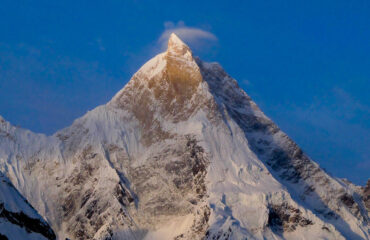 karakoram treks
karakoram treks
karakoram treks
karakoram treks
-
 karakoram trek
karakoram trek
karakoram trek
karakoram trek
-
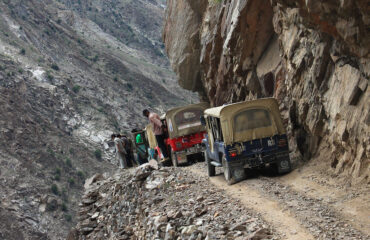 karakoram trek
karakoram trek
karakoram trek
karakoram trek
-
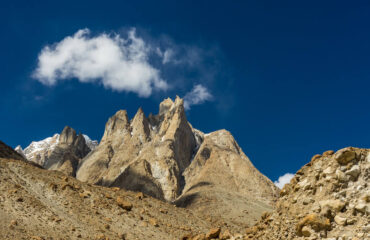 karakoram trek
karakoram trek
karakoram trek
karakoram trek
-
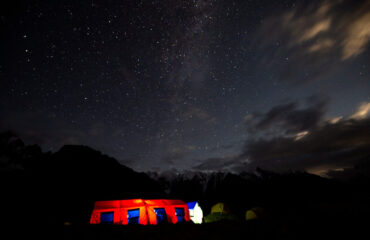 karakoram trek
karakoram trek
karakoram trek
karakoram trek
-
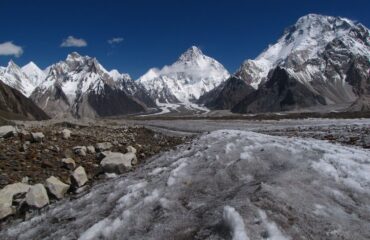 karakoram trek
karakoram trek
karakoram trek
karakoram trek
-
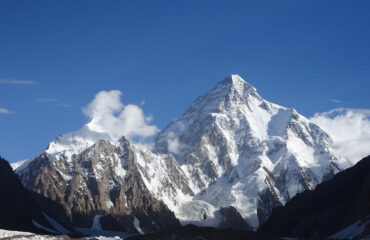 karakoram trek
karakoram trek
karakoram trek
karakoram trek
-
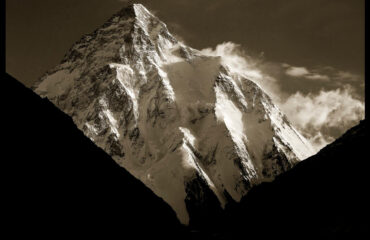 karakoram trek
karakoram trek
karakoram trek
karakoram trek
-
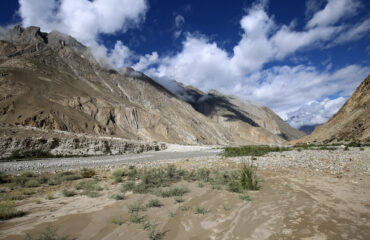 karakoram trek
karakoram trek
karakoram trek
karakoram trek
-
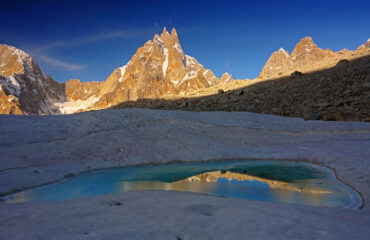 karakoram trek
karakoram trek
karakoram trek
karakoram trek
-
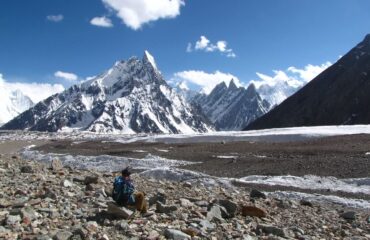 karakoram trek
karakoram trek
karakoram trek
karakoram trek
| Package Confirmed Dates | Trip Status Trip Status | Price (PP) Excluding Flights | Price (PP) Including Flights | |
|---|---|---|---|---|
|
July 5, 2024 - July 27, 2024
|
Guaranteed
|
$2,700
|
N/A
|
|
|
July 25, 2024 - August 17, 2024
|
Guaranteed
|
$2,900
|
N/A
|
|
|
July 5, 2025 - July 27, 2025
|
Guaranteed
|
$2,700
|
N/A
|
|
|
July 25, 2025 - August 17, 2025
|
Guaranteed
|
$2,900
|
N/A
|


